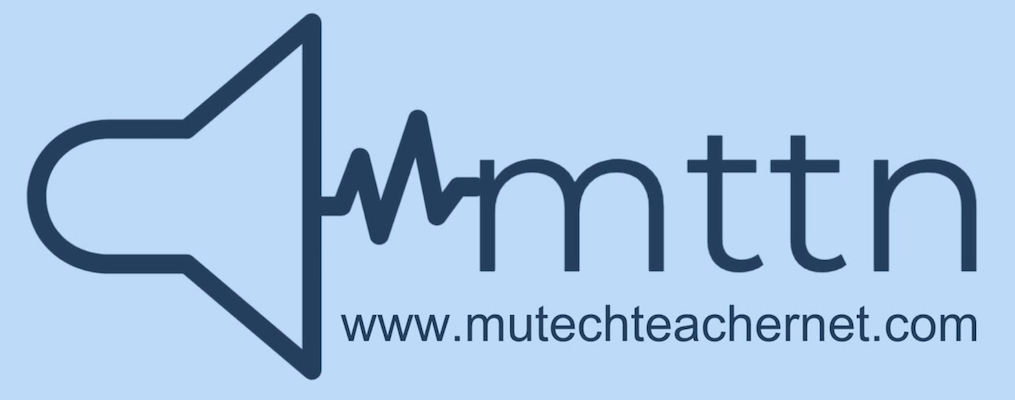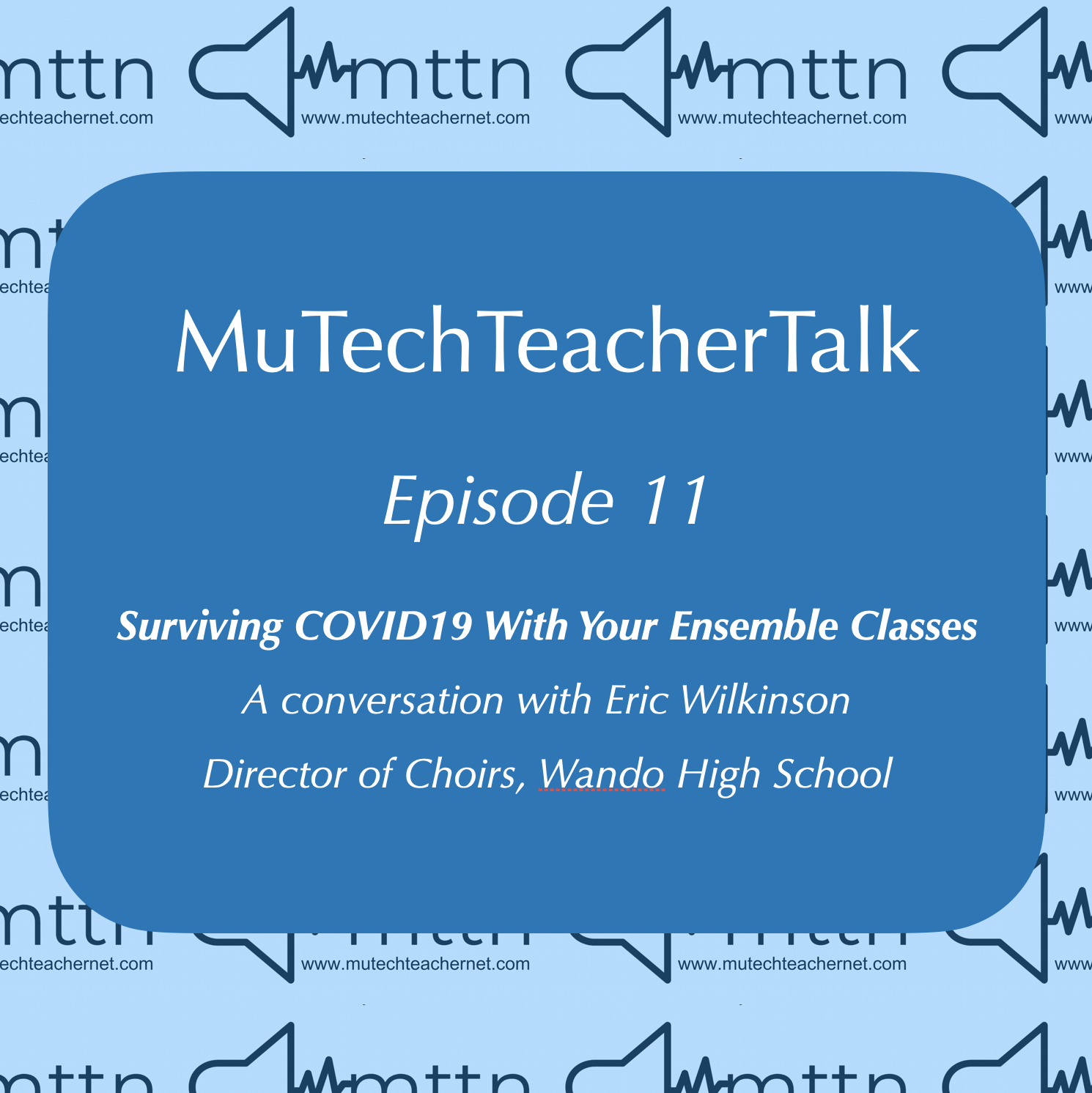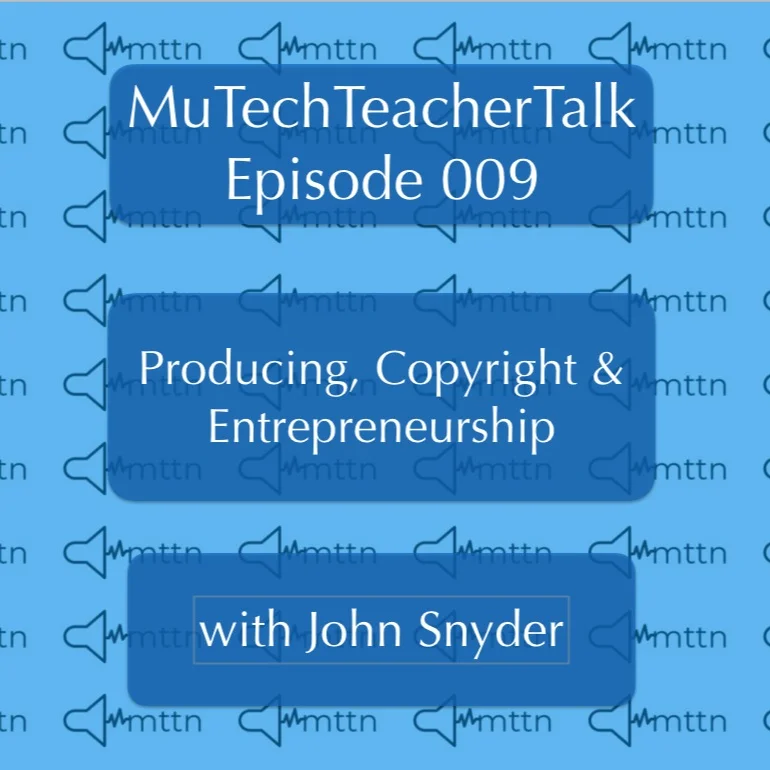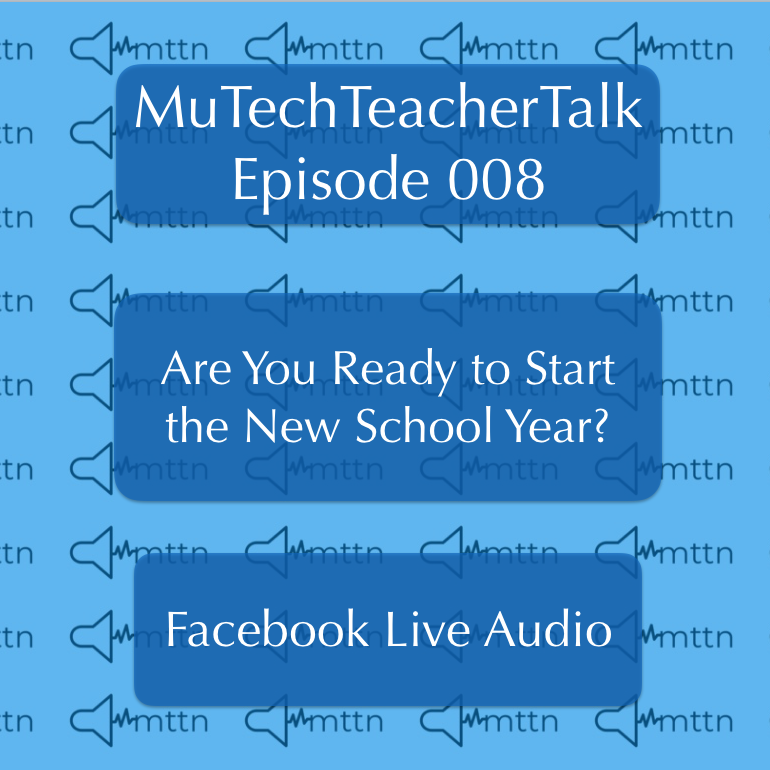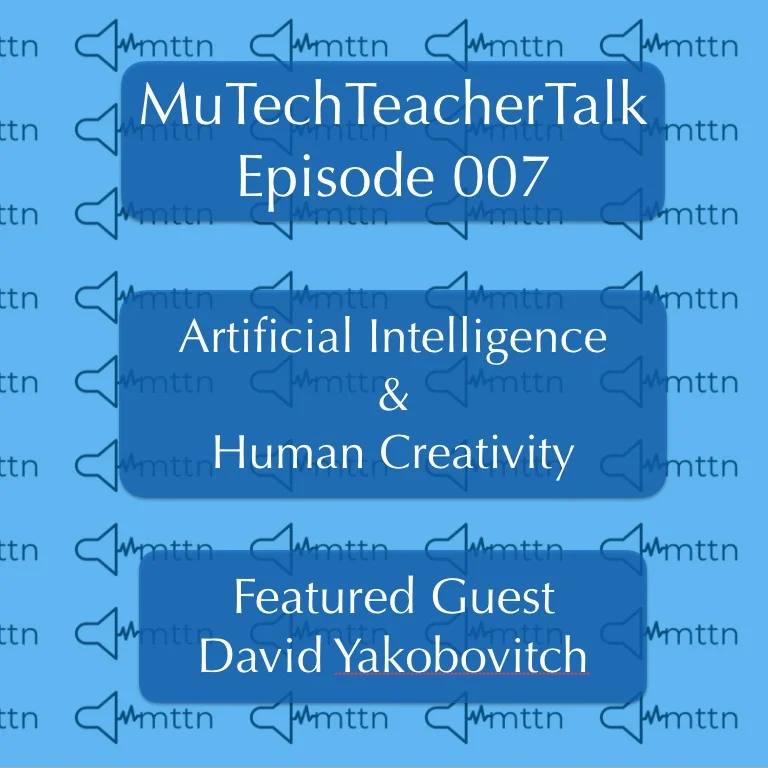The MuTechTeacherTalk podcast series is available on all major podcast providers such as Apple Podcasts, Spotify, Amazon Music, and more.
Help support the podcast by subscribing, leaving a positive review, and sharing with colleagues and friends!
A video version of the podcast is also available on our YouTube Channel.
Dr. Langol and I have a wide-ranging discussion about the music education program at Berklee, the continuing recovery and adjustment of the post-COVID world, and the future of music education and technology.
Read MoreI first met Meaghan at the Texas Music Educators Association Conference in San Antonio, TX. There I attended a session she presented about the hip-hop curriculum that she created for her students. I was blown away by her fresh and innovative approach to engaging her students with authentic and meaningful music-making experiences with a genre of music that her students were likely more familiar with than her. Listen in to learn how she developed this curriculum and where you can find resources to help implement this in any music classroom.
Read MoreListen in as Dr. Freeman and I discuss the innovative and groundbreaking work happening in the Music Technology Dept at Georgia Tech in Atlanta, GA. Topics include computer science and music, composing music with code in Earsketch, the development of AI and its potential impact on the future of music making, and more!
Read MoreTip #1: Camera angle and height
Tip #2: What are you looking at?
Tip #3: Lighting tips and tricks
Tip #4: Microphones
Tip #5: Video editing software
Read MoreListen as Chris and I discuss his path to a career as a music composer for video games. Chris shares his experience and insight into the necessary skills to be successful in this field and what the future may hold for the video game industry.
Read MoreMeet the newly branded and updated MuTech Teacher Talk! The new look and new production schedule will bring regular releases every Monday!
Read MoreThe foundation of everything that we do is based on a term we coined called creative literacy. It’s about kids reading, writing, and reflecting through multiple mediums. We want to make sure that all students, regardless of their abilities, were able to share their knowledge in a medium that worked for them. Our students have developed video games, produced songs, written and staged musicals, produced podcasts, and created a fashion line that was presented as a fashion show. Kids need multiple ways to express themselves and this program provides a stage that these kids can shine on who otherwise may not have that opportunity to shine.
Read MoreThe most important asset to a music producer is their ears and their trust in their ears. Knowing what you like and what you don’t like. Some of the greatest music producers that I have ever met or heard of don’t play anything (musical instrument). But, for me it helps because I can communicate with musicians and we can talk the same language, but it’s not essential.
Read MoreI just kept applying to places and it hit a point where I was like, “this is ridiculously hard to find an opening in post-production audio. I had always loved games and it had always been a thought in the back of my mind that I could try game audio.” After it became obvious that the job hunt was going to be difficult, I was like why not start looking in the games industry? If it’s going to be this hard in the area where I had my degree in studio and post-production audio, why don’t I just aim toward game audio? Because at the time game audio was just a dream.
Read MoreAt the end of this school year, I congratulated my students for making it. Not just through this school year, but the one before that, and the one before that also. That was no small feat for any of us. I told them that I believe that there will never be another year as challenging as this one. And I believe that. I know a lot of colleagues who are leaving the profession, and I understand. Nothing is more important than your personal health and the well-being of your family. It was a terribly trying year in so many ways. I am grateful that I not only made it but finished the year with a sense of accomplishment and optimism. For the last two months of the school year, I woke up every morning. Well, almost every morning and looked forward to going to school and seeing my students and colleagues. As I walked out of school on the last day of post-planning, I was excited to have some R&R time with my family, but already had ideas and plans spinning in my head for next year.
Read MoreThis time between reconstruction and the birth of the Civil Rights Movement was a time of segregation and Jim Crow laws for African-Americans as well as a time of economic depression for the southern states following the end of the Civil War. All of the advancements in technology, education, and music must be viewed over the backdrop of the segregated South.
Read MoreSo, what does all of this have to do with the conundrum of figuring out why college and university music programs are so hesitant to add music technology to their music curricula? Teachers teach the content that they are taught to teach. That content is dictated by the degree-granting institution not the state board of education, chamber of commerce, or local school system. Universities are considered institutions of higher learning and thus a final authority of what constitutes music as a formal course of study. As institutions, universities generally operate on long established systems that most (including those currently operating the system) may not even be aware of or think to question. Even though public colleges and universities can be influenced through some political maneuvering such as budgeting and public policy decisions, most still maintain a very high level of independence concerning the content and curricula of their programs. I am not advocating that this scholarly independence should be taken away or restricted, but I do hope to open a dialogue that would lead these institutions to consider widening the scope of what is considered formal music-making and learning. To do that we need to retrace the development of these institutions and examine the history that brought us to our current systems of educational training.
Read MoreWe just recently shut down our large studio, because simply technology has taken over, and thank God we did. Because of COVID. The large studios that have been really successful are just not getting much traffic now so they are having to let people go. You can do so much with just your iPhone now for crying out loud…
Nobody signs these major record deals anymore. Because of YouTube you can be your own artist, get your own social media platform out there and you do your own distribution. Labels don’t do that anymore, and if they do, they want you to have your own following. Then they are going to give you a check to release your album, and for what? You don’t need that money…
What you have to be prepared for is the word, NO. And the phrase “not right now,” and “maybe later,” and “you’re not what we’re looking for.” I tell my students don’t get discouraged, keep trying. Don’t delete, don’t get rid of tracks. Keep that because there’s going to be a bass line or a drum sound that you can tweak five years from now and it’s going to be a hit!
Read MoreHost: “Where do you think we’re going as the two worlds of classical music and music technology seem to be intersecting more and more?”
MstSgt. Timmons: “For me its an exploration of sound and if we combine an acoustic and an electronic element together that is unique in itself. Rather than being purely acoustic or purely electronic. It opens up a wide array of experiences… I think that these unique sonic experiences are something that people desire and are looking for.
Read MoreWe have never had any time like this before where we are all still working, but we no major concerts coming up. I would say to use this time to reflect or create, revise and revive for yourself and your program. Find fun ways to keep your students singing or playing. This could be a great time to teach composition, improvisation, collaborative songwriting maybe more than you normally would… Stay creative, get after it and have some fun too.
Read More“We literally started from a big block of wood. The only thing that we purchased that was pre-made for the guitar was the neck. I would give this advice to anyone that was thinking about this project. Decide what you can and you can’t do up front. If the guitar neck isn’t right, the rest of the instrument is just never going to be good. So, we bought the neck, but everything else was just a block of wood, the electrical components and the blueprints… We actually learned how to do some CAD work and the students built a CAD design of the guitar in the computer and then moved that over to the CNC router and drew the path for the router to move along the wood. I think it took about 90 minutes for the router to work and cut the entire body out.
Read MoreIn this episode, I have a conversation with John Snyder. John is currently the President of Tweed Studios and Academy in Athens, GA and on the faculty at the University of Loyola in New Orleans where he has been the Chair of the Department of Music Industry Studies.
Snyder has produced hundreds of recordings and CD reissues and compilations as a music and video producer. Recordings he has produced have received 32 Grammy nominations and 5 Grammys. He was recognized in 2018 by Offbeat magazine with a Lifetime Achievement in Music Education Award and was described by allmusic.com as one of the most important jazz record producers of the last 30 years.
As a music producer Snyder produced records with Etta James, Dave Brubeck, Count Basie Orchestra, George Shearing, Gerry Mulligan, Chet Baker, and Dizzy Gillespie among others. He has also recorded Eric Clapton, Paul Simon, Buddy Guy, Santana, Bonnie Raitt, Wynona Judd, Stevie Wonder, Gregg Allman, and Isaac Hayes, among others, on various blues, R&B, and tribute records.
Snyder is also President of Artists House Foundation (http://www.artistshousemusic.org/) which was funded by Herb Alpert to help musicians and music entrepreneurs create sustainable careers.
Read MoreThe episode of MuTechTeacherTalk was created using the audio from a recent Facebook live broadcast that I hosted. The broadcast was in a modified Q & A format, so the interactive content from the broadcast has been edited out for the podcast version. The topics that have been included in this podcast include Goal setting and getting prepared to start the new school year, developing a philosophy of why we are teachers and what we are teaching, how to teach creativity, developing a philosophy of assessment and how to effectively assess creative work, and finally there are two segments about a few really great cloud based apps Soundtrap and Noteflight.
Read MoreData scientist, curriculum developer, and consultant with Galvanize, a leading technology education innovator, David Yakobovitch is our guest for episode 7 of MuTechTeacherTalk.
How do schools and businesses get more females interested in technology courses and careers? What is artificial intelligence and machine learning? Can technology augment human creativity? How has technology impacted the way music producers and consumers create and listen to music? David and I will discuss these questions and more in this episode.
David Yakobovitch is on the leading edge of edge of global data science, app and web development through coding, and technology education. In addition to his work with www.galvanize.com, he publishes the weekly HumAIn podcast (www.humainpodcast.com).
Read More